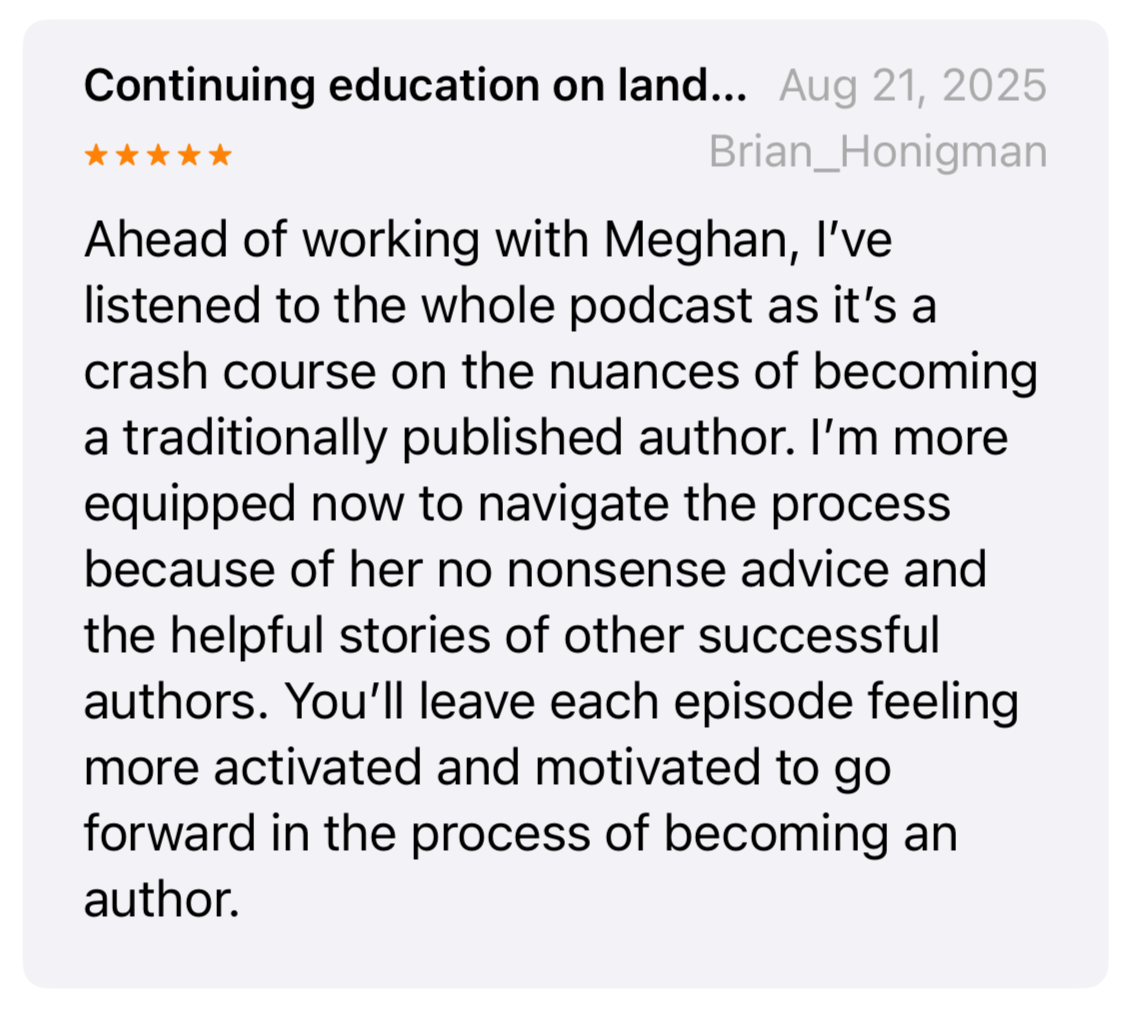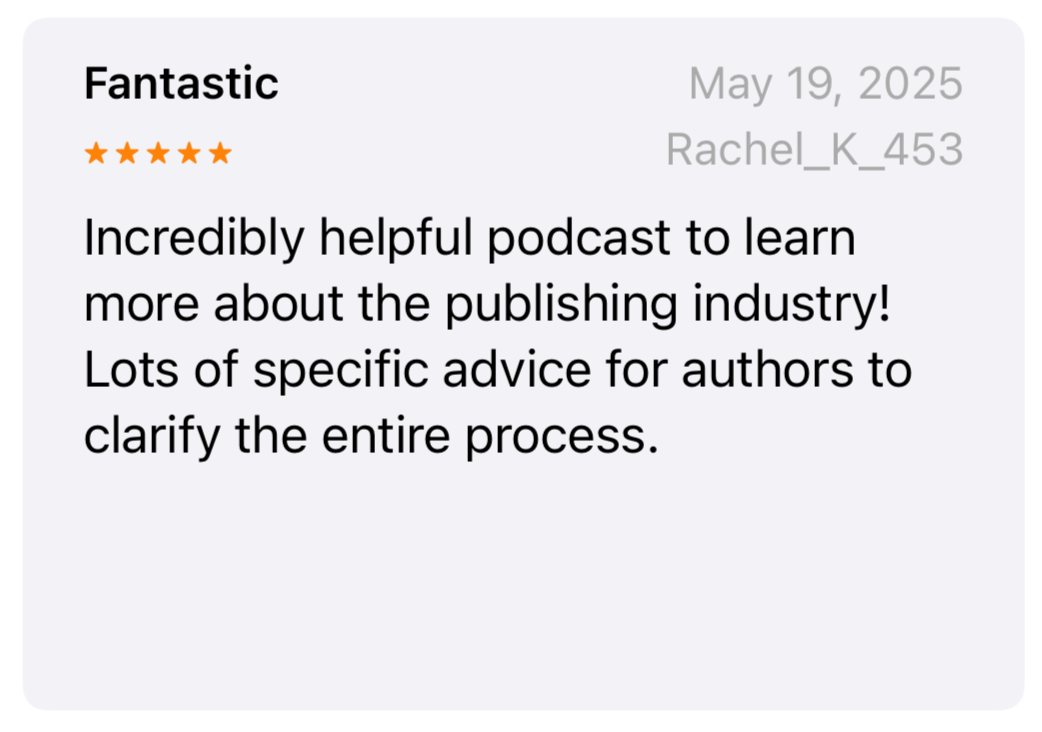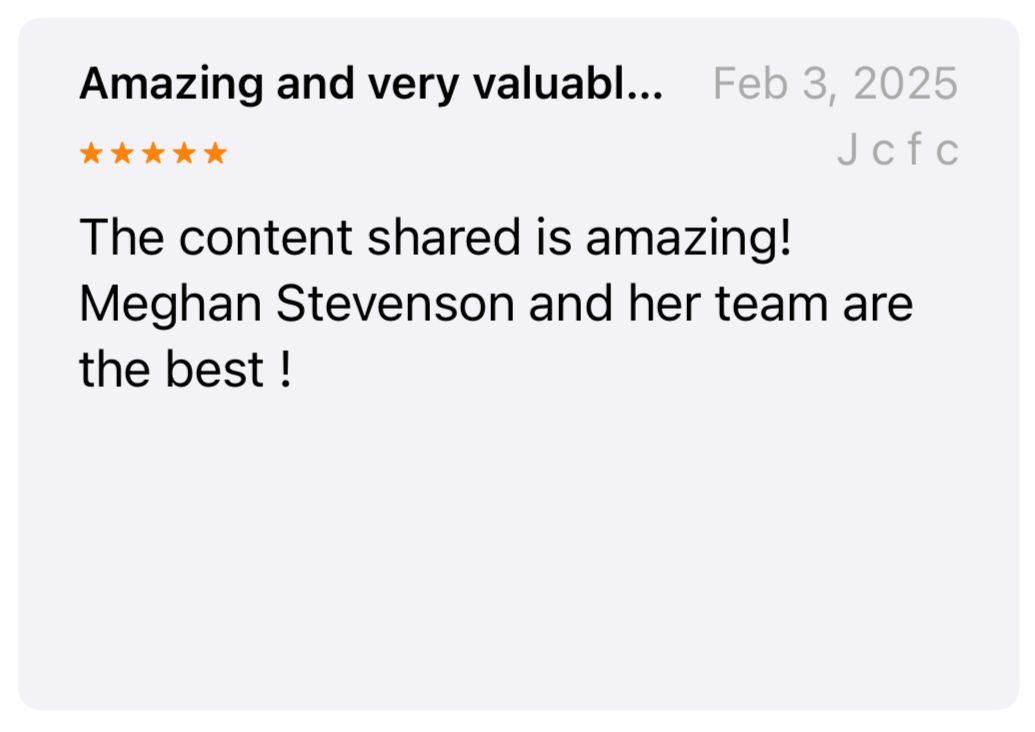Kind of a Big Book Deal
The podcast for every entrepreneur who wants to land a book deal—without losing your mind.
Traditional publishing expert Meghan Stevenson blasts open the gates of the “Big 5” — Penguin Random House, Simon & Schuster, HarperCollins, Hachette, and Macmillan — to share what every entrepreneur and expert needs to know about landing a book deal.
In episodes released every Monday, Meghan shares wisdom and stories from 20+ years in publishing as well as interviews with authors, literary agents, and editors. She also answers questions from listeners like you.
Whether you are an experienced entrepreneur with an empire or are just starting out — this podcast will help you understand what you need to do in order to turn your dream of being a bestselling author into real life.
Episode 28 - Get a Book Deal This Year
What if the book deal you dream about isn’t actually far away, it just needs the right plan, the right timing, and the right support? In this episode, Meghan Stevenson opens the doors to traditional publishing even wider by sharing the exact framework she uses to help experts and entrepreneurs land major book deals. She breaks down her trusted Three P Framework and explains why each step matters more than most aspiring authors realize. From understanding whether your idea can sell, to proving you have a real, working audience, to crafting a compelling proposal, Meghan shows you the path publishers actually want to see.
Episode 27 - How to Hire a Book Coach
What if the guidance you’re trusting for your book dream is actually slowing you down? In this episode, Meghan pulls back the curtain on the publishing world, and the people profiting from it, to help you avoid the traps so many first-time authors fall into. After 20+ years in traditional publishing, she’s seen how crowded the “get published” space has become, and how much of it is built on shaky advice, recycled teachings, and experts with no real experience.
Episode 26 - Leverage PR to Build Platform with Caitlin Copple and Full Swing PR
What if your story could open doors and reshape who gets to be seen? In this episode, Meghan talks with PR expert Caitlin Copple, co-founder of Full Swing PR, about the kind of visibility that actually drives results for entrepreneurs who want book deals and real impact.
Episode 25 - How and When To Choose Your Book's Categories and Comps
What if your book idea isn’t the problem, it’s your platform? In this episode of Kind of a Big Book Deal, publishing expert Meghan Stevenson breaks down why building your author platform matters more than obsessing over comps, subcategories, or bookstore placement.
Episode 24 - Why Authors Can Stop Competing with Ruchika Malhotra
What if success wasn’t about competition but collaboration? In this episode of Kind of a Big Book Deal, host Meghan Stevenson sits down with bestselling author Ruchika Tulshyan, whose new book Uncompete flips the script on what it means to win. Ruchika shares how the myth of “doing it all yourself” keeps entrepreneurs and authors burnt out and isolated and how equity, generosity, and radical collaboration can build true, sustainable success.
Episode 23 - How to Build an Author Platform With—or Without—Social Media Followers
In this episode of Kind of a Big Book Deal, host Meghan Stevenson reveals the missing piece behind most failed book pitches: intellectual property that’s uniquely yours. She explains why having your own framework, language, and approach isn’t just nice, it’s non-negotiable if you want to stand out to agents and publishers.
Episode 22 - From Corporate Darling to Entrepreneurial Author with Jamie Trull
In this episode, host Meghan Stevenson sits down with CPA and profit strategist Jamie Trull to talk about building businesses that thrive, not just survive. Jamie shares her journey from corporate life at Coca-Cola to creating a booming financial education platform. Jamie’s new book Hidden Profit offers a smarter, more adaptable approach to managing money. She also reveals the power of building genuine community and how showing up with service first leads to long-term loyalty and growth.
Episode 21 - When Rejections Matter—and When They Don't
In this episode of Kind of a Big Book Deal, host Meghan Stevenson pulls back the curtain on the truth behind publishing rejections and what they actually mean for your book journey. It offers clarity and encouragement for aspiring nonfiction authors who feel defeated by “no.” By breaking down real industry language, Megan equips entrepreneurs to know when to adapt, when to pivot, and when to move forward with confidence.
Episode 20 - How Self-Published Authors Get a Traditional Publisher
What does it really take to land a traditional book deal and is it even worth the leap from self-publishing? In this episode of Kind of a Big Book Deal, host Meghan Stevenson answers a common question from listener DeShanna, an educator with three self-published books who’s eager to break into traditional publishing.
Episode 19 - How 18 Months of Rejection Turned Into a Six-Figure Book Deal with Dr. Natalie Nixon
What if the very thing holding you back from a traditional book deal isn’t your writing, but your platform? In this episode, Meghan sits down with Dr. Natalie Nixon to unpack the highs and lows of her author journey. From countless rejections to finally landing a deal for The Creativity Leap, Natalie reveals the grit, courage, and community support it took to get there.
Episode 18 - Is Traditional Publishing Right For You?
What separates the dreamers from the authors with a big book deal? In this real talk episode, Meghan Stevenson pulls no punches. She shares the uncomfortable truth behind traditional publishing success rates and the one thing that determines who makes it and who doesn’t: alignment. If you’re an entrepreneur hoping to land a publishing contract, this episode will challenge your assumptions and help you decide if the traditional path is really right for you.
Episode 17 - How Many Followers You Need to Get a Book Deal
In this episode of the Kind of a Big Book Deal podcast, Meghan tackles the question: Is there a magic number for your author platform? Discover what a modern, successful author platform really looks like today, why it’s deeply personal to each nonfiction author, and how to tailor yours for maximum impact.
Episode 16 - From Self-Publishing To a Three-Book Deal with Denise Duffield-Thomas
Denise Duffield-Thomas speaks with Meghan in this episode about her journey from self-publishing her first book to landing a traditional book deal with Hay House. She also speaks about why a book should be a part of your marketing funnel and not your main income stream, the power of mentorship, and letting go of perfection.
Episode 15 - How Entrepreneurs Sabotage Their Book Deal
In this no-BS episode of the Kind of a Big Book Deal podcast, Meghan Stevenson reveals the most common mistakes aspiring authors make on the road to securing a traditional publishing deal and how to avoid them. Discover why educating yourself about the publishing industry, building a genuine and impactful author platform, and seeking guidance from true publishing experts are non-negotiables in today’s competitive nonfiction market.
Episode 14 - How Book Advances Work
Listener Becky had questions about book advances, and Meghan answers. From how advances work and who gets paid when to why long-term ROI is really what you want to look at, you’ll gain a clear understanding of book-proposal numbers and how to navigate advances to maximize your nonfiction publishing success.
Episode 13 - Financial Freedom, Podcast Growth, and Publishing Power Plays with Jamila Souffrant
In this episode Meghan speaks with Jamila Souffrant about her inspiring journey from starting a personal blog to landing a multiple six-figure traditional book deal. Jamila shares how she built her author platform from the ground up, strategically attracting literary agents and publishers while staying true to her core values and message. You’ll discover practical strategies for creating a powerful author platform that reflects your vision and positions you for nonfiction publishing success with major publishers.
Episode 12 - How To Understand Your Author Platform Right Now
Dive deeper into the power of your author platform. Meghan explains why your author platform is just as critical to landing a traditional book deal as your book idea itself. She also talks about the three common business models that shape successful nonfiction author platforms and how to build your own in a way that aligns with your brand.
Episode 11 - How To Get the Best Advice for Your Book
In this episode Meghan gets real about why so much common publishing advice doesn’t actually help you land a traditional book deal. Instead, she reveals what does work to move you closer to securing a lucrative nonfiction publishing contract. She explains why partnering with true publishing specialists matters and how doing thorough due diligence before investing your time, energy, or money can protect your momentum and increase your odds of success.
Episode 10 - From Idea to Deal: Elaine Lin Hering's Publishing Journey
Meghan speaks with Elaine Lin Hering, author of Unlearning Silence, on her nine-year journey to publishing her book with Penguin Random House. Hear how she found the spark of her idea, what held her back, why she went from doomscrolling to taking action and the highs and lows of traditional publishing.
Episode 9 - The Basics: What Bestseller Lists Don't Tell You: NYT, USA Today
In this episode, Meghan shares the truth of bestseller lists, from skewed numbers to curated categories. Learn what the New York Times, USA Today, and Amazon use to make their lists, why some successful books never make a list and how becoming a backlist bestseller is a fantastic goal. With insights from Meghan, discover how understanding bestseller lists can help you set realistic publishing goals and navigate the path to securing your own traditional book deal.







